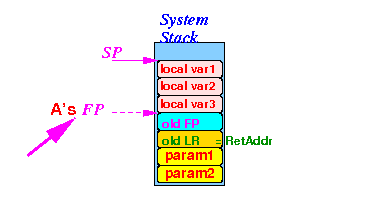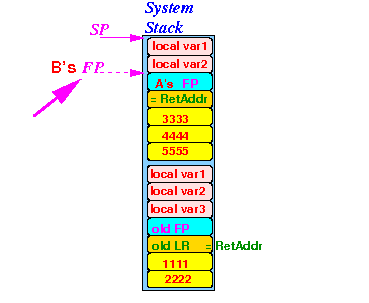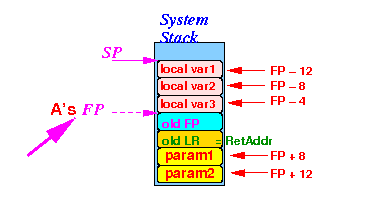- Previously,
I have shown you that
due to the
event sequence in
a function call with
parameters:
- The caller will use
this sequence of
instructions to
pass parameters to
a function:
How to pass parameters using the stack to a function: (1) push params (in reverse order) (2) bl function (3) clean up parameters on stack
- The called function will
use these
sequences of
instructions
to
build its stack frame and
break down its stack frame:
/* --------------------------------- Prelude code: build stack frame --------------------------------- */ push {lr} // Save return address push {fp} // Save old FP mov fp, sp // Initial function's own FP sub sp, sp, #N // Allocate N bytes on stack for local vars /* ------------------------------------------- Postlude code: break down the stack frame and return to caller ------------------------------------------- */ mov sp, fp // De-allocate stack space of local vars pop {fp} // Restore old FP pop {pc} // Return to caller
In this webpage, I want to show you the effect of these sequence of instructions and their effect on the program stack with 3 examples
- The caller will use
this sequence of
instructions to
pass parameters to
a function:
- In example 1, I will show you
what happens inside the
computer system when:
main( ) { Calls a function A and passes 2 parameters to A. In Java, this would be written as: A(1111,2222) } A( int a, int b ) { A( ) has 3 local variables. In Java, you would write: int x, y, z; // Define 3 local vars return(9999); // A( ) always returns 9999 }I will only show you how the parameters and local variables are stored in the program stack
The assembler code is as follows:
main: mov r0, #2222 // Pass 2222 as parameter 2 on stack push {r0} mov r0, #1111 // Pass 1111 as parameter 1 on stack push {r0} bl A // Call function A add sp, sp, #8 // Clean up parameters on the stack // When A returns, you will see the return value in r0 = 9999 nop nop Stop: nop /* ============================================== Function A: param and locals in stack ============================================== */ A: // When run in EGTAPI - you will see {1111, 2222} on stack /* **************************************** Prelude: build stack frame **************************************** */ push {lr} // Save return address in LR push {fp} // Save Frame Pointer in FP mov fp, sp // Initialize my own FP sub sp, sp, #12 // I create 3 local variable in stack nop // These instructions in A( ) can use stack nop // to access parameters and local variables /* ==================================================== We can use a register to return the return value ==================================================== */ mov r0, #9999 // Pass return value in register r0 /* ************************************************ Postlude: break down stack frame ************************************************ */ mov sp, fp // De-allocate the local variables pop {fp} // Restore old FP pop {pc} // ReturnI will show this example in class and also highlight the effect of the instructions
What you should notice is:
- Before
main( ) calls
A( ), the
program stack is
empty
- After
A( ) finishes
building the stack frame,
the stack frame has this
structure:

During the execution of method A( ), we can access the parameters and local variable in the program stack using an offset from the base address in register FP !!!
(We will learn how to do this below)
- Before
main( ) has
clean up the parameters in the
program stack,
the program stack is
empty
again !!!
(That's what we want !!! We do not want to leave any garbage on the program stack !!!)
- Before
main( ) calls
A( ), the
program stack is
empty
- Example Program:
(Demo above code)

- Prog file: /home/cs255001/demo/asm/8-sub/skel-stack.s
How to run the program:
- To compile: as255 skel-stack
- To run: use EGTAPI
- In example 2, I will show you
what happens inside the
computer system when
main( ) calls
A( ) and
then A( ) calls
B( ) -- both calls
use the program stack:
main( ) { A(1111,2222) } A( int a, int b ) { int x, y, z; // Define 3 local vars B(3333,4444,5555); return(9999); } B( int a, int b, int c ) { int x, y; // Define 2 local vars return(8888); }I will only show you how the parameters and local variables are stored in the program stack
The assembler code is as follows:
main: mov r0, #2222 // Pass 2222 as parameter 2 on stack push {r0} mov r0, #1111 // Pass 1111 as parameter 1 on stack push {r0} bl A // Call function A add sp, sp, #8 // Clean up parameters on the stack // When A returns, you will see the return value in r0 = 9999 nop nop Stop: nop /* ============================================== Function A: param and locals in stack ============================================== */ A: // When run in EGTAPI - you will see {1111, 2222} on stack /* **************************************** Prelude: build stack frame **************************************** */ push {lr} // Save return address in LR push {fp} // Save Frame Pointer in FP mov fp, sp // Initialize my own FP sub sp, sp, #12 // I create 3 local variable in stack nop // These instructions in A( ) can use stack nop // to access parameters and local variables /* ========================================= Call B( ) with 3 parameters ========================================= */ mov r0, #5555 // Pass 5555 as parameter 3 on stack push {r0} mov r0, #4444 // Pass 4444 as parameter 2 on stack push {r0} mov r0, #3333 // Pass 3333 as parameter 1 on stack push {r0} bl B // Call function B add sp, sp, #12 // Clean up parameters on the stack nop // We are back in A( ) nop // We will now return to main( ) /* ==================================================== We can use a register to return the return value ==================================================== */ mov r0, #9999 // Pass return value in register r0 /* ************************************************ Postlude: break down stack frame ************************************************ */ mov sp, fp // De-allocate the local variables pop {fp} // Restore old FP pop {pc} // ReturnI will show this example in class and also highlight the effect of the instructions
What you should notice is:
- Before
main( ) calls
A( ), the
program stack is
empty
- After
A( ) finishes
building the stack frame,
the stack frame has this
structure:

During the execution of method A( ), we can access the A( )'s parameters and A( )'s local variable in the program stack using an offset from the base address in register FP !!!
(We will learn how to do this below)
- After
B( ) finishes
building the stack frame,
the stack frame has this
structure:

During the execution of method A( ), we can access the B( )'s parameters and B( )'s local variable in the program stack using an offset from the base address in register FP !!!
(We will learn how to do this below)
- After
B( ) has
returned and
A( ) has
cleaned up the parameters in the
program stack,
the program stack is
restored
back to:

When method A( ) continues, we can access the A( )'s parameters and A( )'s local variable in the program stack using an offset from the base address in register FP !!!
(That's what we want !!! We must be able to continue with the execution of A( ) after the method call B( ) completes !!!
- After
main( ) has
clean up the parameters in the
program stack,
the program stack is
empty
again !!!
(That's what we want !!! We do not want to leave any garbage on the program stack !!!)
- Before
main( ) calls
A( ), the
program stack is
empty
- Example Program:
(Demo above code)

- Prog file: /home/cs255001/demo/asm/8-sub/skel-stack2.s
How to run the program:
- To compile: as255 skel-stack2
- To run: use EGTAPI
- If you realize that
throughout the
execution of
the A( ) method
(even when A( ) calls
another method B( ), the
stack frame
always has this
structure:

Then you can easily understand that you access the parameters and local variables with these offsets:

- Here is a demo program that show you
how to set:
localVar1 = param1; localVar2 = param2; localVar3 = param1 + param2;Example:
main: mov r0, #2222 // Pass 2222 as parameter 2 on stack push {r0} mov r0, #1111 // Pass 1111 as parameter 1 on stack push {r0} bl A // Call function A add sp, sp, #8 // Clean up parameters on the stack // When A returns, you will see the return value in r0 = 9999 nop nop Stop: nop A: // When run in EGTAPI - you will see {1111, 2222} on stack /* **************************************** Prelude: build stack frame **************************************** */ push {lr} // Save return address in LR push {fp} // Save Frame Pointer in FP mov fp, sp // Initialize my own FP sub sp, sp, #12 // I create 3 local variable in stack // How to to access parameters and local variables // stored in the program stack ldr r0, [fp, #8] // Get parameter 1 = 1111 str r0, [fp, #-12] // Store in local variable 1 ldr r1, [fp, #12] // Get parameter 2 = 2222 str r1, [fp, #-8] // Store in local variable 2 add r0, r0, r1 str r0, [fp, #-4] // Store sum in local variable 3 /* ================================================= We can use a register to return the return value ================================================= */ mov r0, #9999 // Pass return value in register r0 /* ************************************************ Postlude: break down stack frame ************************************************ */ mov sp, fp pop {fp} pop {pc} // Return
- Example Program:
(Demo above code)

- Prog file: /home/cs255001/demo/asm/8-sub/skel-stack-access.s
How to run the program:
- To compile: as255 skel-stack-access
- To run: use EGTAPI